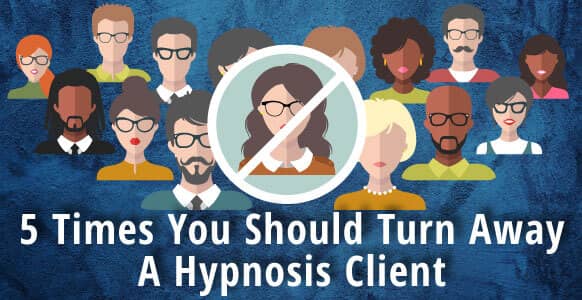
If you’re a professional hypnotherapist, there’s something you need to have more than anything else in the world…
Hypnotherapy clients!
And that goes for whether you’re just starting out in your profession or you’ve been a hypnotist for a good few years.
Without clients, it makes it hard to go out into the world and transform the lives of others, no?
But from a more practical standpoint, if hypnosis is your bread and butter, it becomes difficult to make a living if your appointments diary is as empty as the Australian outback.
That said, sometimes making a living has to take second place.
Sometimes instead of taking on new clients, you have to turn them away – because as a hypnotist – your role is to help improve people’s lives.
The moment you feel you’re unable to do this – regardless of the reason – you have a professional and ethical obligation to turn them away, or stop working with them because you can see hypnosis isn’t the right form of treatment for them.
By continuing to work with someone you don’t feel comfortable helping, you may wind up creating more problems instead of solving them. What’s more, it could land you in hot water.
So what kind of red flags should you look out for?
Below are 5 scenarios you should keep at the forefront of your mind when working with any client (or even if you practice hypnosis out of a professional setting – you still have an ethical obligation to tread carefully when you’re working with someone’s mind).
This list isn’t exhaustive, but should provide you with some guidance as a starting point.
1. A Hypnotherapy Client Doesn’t Really Want To Be Hypnotized

Some people get pressured into visiting a hypnotherapist by well-meaning friends, family members and spouses.
That brings up an almost insurmountable stumbling block. As you know, a person can’t be hypnotized unless they want to be. It has to be their decision.
So if they’re doing it because they think they have to – it’s unlikely that they’ll be able to enter into a hypnotic state.
Likewise, if they don’t believe in the power of hypnosis – or the hypnotist’s skills – you’ll never be able to help them.
It just ends up wasting everyone’s time and can damage your reputation as a hypnotist. That’s one of the reasons why it’s so important for you to have a pre-talk with every client to ensure they’re genuine and eager to be helped through the power of hypnosis.
2. You’re Not Sure You Can Help Them

Hypnosis can be used to relieve a myriad of conditions. But this also means as a hypnotist, you have to be familiar with how to best work with them.
Suppose, for instance, that someone comes to you with a problem you’ve never encountered before.
That might happen early in your hypnosis career, when you may not have been exposed to quite as many people as a more seasoned professional. In that situation, what can you do?
Well, if you aren’t sure, there’s only one solution. Don’t do anything! Reschedule the appointment for a future date. Then explain to your client that you would like to do some research to make sure you offer them the best and most comprehensive service available.
Tell them the truth – that you’ve not treated this condition or problem before and you want to get it right. That by being able to do some research first, you feel you can help them resolve the issue.
They’ll probably be grateful that you’re being open and above board about it. And when they do come back and you’re able to help them, it will go a long way towards establishing your reputation as a professional, genuine and caring individual.
3. You Feel Really Out Of Your Depth

As mentioned above, hypnosis can help with an enormous range of issues. But there are some things that are better left to professionals in other fields.
This is particularly the case with people suffering from serious mental health issues or trying to cope with emotional trauma, such as childhood abuse, sexual assault and psychosis.
Unless you know what you’re doing, and have had additional training with severe trauma, it’s possible that you could do more harm than good.
It’s likely that they need to see a specialist or health professional well versed in these areas, such as a trained psychologist or psychiatrist equipped to give them the help and support they require. Or if you feel confident in doing so, you could refer them to a fellow hypnotherapist who works specifically with trauma.
But in any case, you should refer them to their GP first who will in turn refer them on to the appropriate department.
4. A Client Presents With A Physical Ailment, But Hasn’t Got A Medical Referral

This might happen with a problem such as tinnitus or back pain. Hypnosis can help, but only if the client’s medical issues have been properly diagnosed.
As a practicing hypnotist, you can’t simply take the client’s word that he or she has the issue in question – and no, “Google doctor” isn’t a good enough reference!
Going back to the example of tinnitus, there are lots of issues that can cause hearing loss and/or ringing in the ears – tinnitus is only one of them. That’s why it’s crucial that your client has seen their doctor and that hypnosis has been recommended as a possible course of action.
If they haven’t seen their doctor, ask them to do so and return with written referral for your services. Tell them you’ll be happy to help them once they’ve complied with those conditions. You can also offer to speak with their doctor if they have questions about what service you’re offering as a hypnotherapist.
You can explain that you need to be sure it’s tinnitus so that you can tailor the hypnosis session accordingly and make sure it works to their advantage.
5. You Can Clearly See That Hypnosis Isn’t Working

Sometimes, despite your best efforts, hypnosis isn’t doing the trick. Realistically speaking, it’s a fact that hypnosis doesn’t work for everyone. No hypnotist has ever gotten 100% results across the board with all of their clients – FACT!
Suppose, for instance, that you’ve been working with someone for a while but you’re not getting any results.
It might be that another form of treatment, or a different hypnotist, would suit the person and their problem better. If so, be honest and tell them the truth.
Never let your ego interfere with someone’s mental, physical or emotional health… ever.
After all, if you can’t really help them, it’s going to become obvious to them too, sooner or later. This way you save them time and money while maintaining your integrity in the process. So everyone’s a winner.









![[ADVANCED GUIDE] How To Master Hypnotic Regression Therapy - Part I: Essential Principles To Profoundly Transform Your Subject’s Emotional Trauma [ADVANCED GUIDE] How To Master Hypnotic Regression Therapy - Part I: Essential Principles To Profoundly Transform Your Subject’s Emotional Trauma](https://hypnosistrainingacademy.com/wp-content/uploads/2016/09/hypnotic-regression-therapy-essential-principles.jpg)




